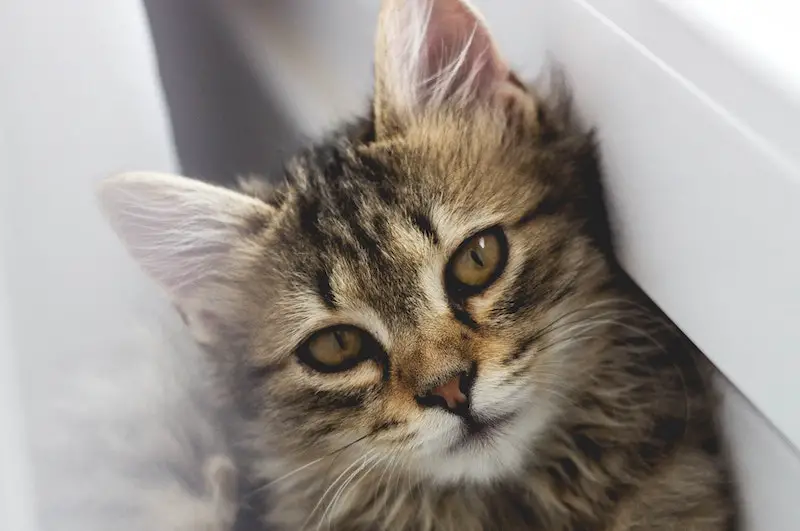When it comes to cats, we often think of them as loving, cuddly, and even funny little creatures. But have you ever wondered if cats have an ulterior motive? Do cats want to kill you?
The History of Cat-Human Interactions
Historically, cats have had a rather strange relationship with humans. Cats have been seen as both divine and demonic creatures, depending on the era. Ancient Egyptians viewed cats as gods, while in medieval Europe, cats were seen as agents of the devil.
Today, cats are one of the most popular pets around the world. But despite their popularity, there is still some debate as to whether cats are truly our friends or if they secretly want to kill us.
The Science Behind Cats
When it comes to understanding cats, science provides some useful insight. Studies have shown that cats can recognize their owners and form strong bonds with them. Cats also have an instinctive hunting drive that can be triggered by certain stimuli, such as a mouse running across the floor.
However, cats do not have any desire to kill humans. In fact, cats are more likely to show aggression towards other cats than they are towards people. This means that cats are not trying to harm us, but rather they are just expressing their natural instincts.
The Myth of Cats Trying to Kill You
Despite the scientific evidence, there are still some people who believe that cats want to kill humans. This is likely due to the fact that cats are often depicted as sinister creatures in popular media.
However, this is simply not true. Cats may have an instinctive hunting drive, but they do not have any desire to kill humans. In fact, cats are more likely to be scared of people than they are to attack them.
Would Cats Kill You if They Were Bigger?
Although cats are not normally known for being dangerous, many people wonder what would happen if cats were larger and more powerful animals. Would cats be as friendly and gentle as they are now, or would they turn into ferocious man-eaters?
Fortunately for us, cats are highly unlikely to ever become large enough to pose a danger to humans. Cats are predatory animals, but they are not built to take down large prey. They are built for agility, speed, and stealth, not strength or size. Even if cats somehow managed to grow in size, they would still lack the necessary tools to make them a serious threat to humans.
Cats are also naturally inclined to be gentle and affectionate. Although they can be territorial and aggressive at times, they are also known for being loyal, loving, and gentle with their owners. They are unlikely to ever become a menace to humans, regardless of their size.
So, while it’s certainly entertaining to imagine what would happen if cats were larger and more powerful animals, it’s highly unlikely that they would ever pose a threat to humans.

Can Cats Seriously Hurt You?
Yes, cats can seriously hurt you if not managed properly. Although cats are generally considered to be safe and gentle animals, they can inflict serious harm if provoked or mishandled. Cats have sharp claws and teeth that can easily penetrate skin, and the force of their bites and scratches can cause serious physical harm. Even a playful cat can cause injury if it is not handled correctly. For example, cats can scratch or bite if they feel threatened, and they can cause deep puncture wounds if they become overly excited while playing.
Therefore, it is important to always be aware of a cats behavior and to take the necessary precautions to keep yourself and others safe. It is also important to never leave small children alone with cats, as they may not understand the dangers that cats can pose. In addition, it is important to be aware of signs of aggression in cats, such as hissing, growling, or swatting, and to take steps to de-escalate the situation before it becomes dangerous. By taking these simple steps, you can ensure that cats remain a safe and enjoyable part of your life.
Conclusion
So, do cats want to kill you? The answer is a resounding no. Cats may have an instinctive hunting drive, but they do not have any desire to harm humans. In fact, cats are more likely to show aggression towards other cats than they are towards people.
FAQs: Do cats want to kill you?
It is important to remember that cats are predators, and that some cats may express their natural predatory behavior towards humans. If a cat shows signs of aggression such as growling, hissing, swatting, or biting, it is important to take these warning signs seriously.
It is also important to look out for signs of stalking behavior. Cats may display this behavior if they are trying to catch or attack you. This includes following you around the house, crouching in hiding spots and watching you, or trying to ambush you.
Finally, it is important to look out for signs of extreme jealousy or possessiveness. If a cat is constantly trying to separate you from other people or animals, it may be a sign that they are trying to protect you from perceived threats. If the cat is displaying this behavior and it is accompanied by other signs of aggression, it may be a sign that they are trying to hurt or kill you.
Cats have an innate hunting ability, and are natural predators in the wild. The instinct to hunt and kill is strong in cats, and can be seen when they catch and play with mice, birds, and other small animals. While cats may not always be successful in their hunting endeavors, they do have a strong instinct to hunt and kill.
However, a cat’s instinct to kill is not always as strong as its instinct to hunt. In fact, some cats may be more likely to avoid killing their prey, opting instead to play with it or let it go. This is likely due to the cats’ natural aversion to killing, as they prefer to avoid harming their prey when possible.
Furthermore, cats that have been domesticated may no longer have the same instinct to kill as their wild relatives. This is because they have been bred to be more docile and less likely to hunt and kill. Therefore, it is important to remember that not all cats have an instinct to kill, and that domesticated cats are generally less likely to do so than their wild counterparts.
No, cats do not get revenge on humans. It is a common misconception that cats are vengeful creatures and will seek revenge on their owners if they are mistreated. However, this is simply not true. Cats are typically very forgiving and will not spite their owners for any perceived wrongs.
In fact, cats are usually very loving and loyal pets, and they generally display more affection towards their owners when treated with kindness. Cats can become resentful if they are abused or neglected, but this is not typically a form of revenge. Instead, cats are trying to protect themselves from further harm and will usually act out by avoiding their owners and hiding.
Cats typically display certain behaviors before they attack, such as hissing, growling, arching their backs, and puffing up their fur. They may also become more aggressive and display stalking behavior. It is important to recognize these signs and back away slowly as soon as possible.
It is also worthwhile to be aware of the triggers that may provoke a cat to attack. Cats may become aggressive if they feel threatened or are protecting their territory. They may also become aggressive if they are in pain or are startled by loud noises or sudden movements. It is important to recognize these triggers and remove yourself from the situation if possible.
One particular species of cat, the black-footed cat, is known to be particularly vicious and has been known to attack and kill humans.
These small cats, native to Southern Africa, are the deadliest cats in the world relative to its size. They are small in stature, measuring only up to 10 inches in length, but they are incredibly fast and agile, and can easily catch their prey.
Black-footed cats are nocturnal hunters, and they typically hunt small mammals, reptiles, and birds. They have even been known to hunt rabbits, hares, and porcupines. They also scavenge, and have been known to take advantage of carrion left by other predators.
Though they are small, these cats have an aggressive nature and are known to attack humans when they feel threatened. They have even been known to stalk and attack people who have gotten too close to their dens, or who have disturbed their young.














